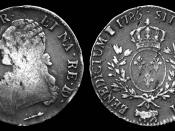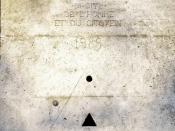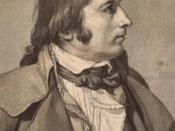The book, "The Kings Trial" is based around the trial of Louis the XVI. He is a moral and just person, much the opposite of his accusers. This trial is one of political and symbolic importance rather then one of merit. The Convention's actions and accusations merit nothing but disgust and repulsion. The sheer ignorance of the criminal code that they had supported does nothing but further push the limits of an unjust trial. Louis XVI's lawyers brilliantly refute the Conventions accusations and arguments while being in the lose-lose situation that David P. Jordan displays in "The Kings Trial".
It is the Convention that accuses Louis of many things, but primarily Treason. As fair is fair, they arrest and try him for the numerous reasons mentioned in the acte enonciatif, written by Jean-Baptiste-Robert Lindet. Although he was going to be tried in the court of law, there was nothing fair about the trial.
The basic procedure of this trial violates the criminal code from the very start, seeing as the Jury of Accusations was appointed by the Convention and consisted of many of their own. This means that both parties, sending him to trial and trying him, are an incestuous group at best. This in itself is illegal, but is not the only illegality that takes place. There are many violations of the criminal code of 1791 taking place within the trial ranging from Louis being denied a lawyer initially, to being given inadequate time to prepare a defense, to restricted access to the evidence being used against him, and to the ability to call witnesses. These violations undoubtedly put a spin on the trial at hand and left Louis to a great disadvantage, starting with to having to refute all the accusations posed against him in the acte enonciatif alone.
The acte enonciatif was written in the form of history from the dates of May 1787 to August 10th 1792. Within this document the accusations are posed, incorporating the papers from "armoire de fer" in such a way to make the king appear to be deceitful and dishonest. Many of the accusations use these papers, which were never verified, as the backing of their arguments. This unfounded information is later denounced by the King and yet still incorporated into the trial as factual evidence, violating the criminal code. Yet it is this that is used to form the accusations against the king, none of the charges would have been able to stand up in court or in the minds of the people if these papers had been considered invalid. Unfortunately, when Louis acquired legal services the papers were instated as factual. Even his lawyers were unable to change this and so the accusations, of which there were many, were left unchanged also.
The acquisitions begin with tyranny destroying liberty. These charges are founded in the acte enonciatif and posed by Barer in his interrogation. The allegations begin with Barere telling the court that "You (Louis XVI) suspended the meetings of the Estates General, dictated laws to the nation at the royal séance, and posted armed guards" . These points are the evidence provided against Louis regarding his tyranny. Although he is being accused of destroying liberty, later Barere also accuses him of destroying national liberty by "delaying the decrees abolishing personal servitude and delaying recognition of the Declaration of Rights of Man and Citizen." The thought that liberty was violated is seen also when Barere accuses Louis of speaking as a tyrant, and ordering troops to march on Paris with the intention of spilling blood on August 10th. Louis also apparently: attempted to corrupt Talon and Mirabeau, and hence violate his oath; spent public money with the intent of corruption; and tried to flee the Kingdom. These are the accusations that Louis faced, and faced here alone.
It was not until after the interrogation that Louis was granted the council of Francois-Denis Tronchet, Guillaume-Chretien De Lamoignon de Malesherbes, and Raymond DeSeze. So during this interrogation Louis has to answer the accusations without council. He remained composed and effectively answered to the alleged crimes against him. To these he said that: there were no laws against what he was accused of; that he was in charge of whether or not his troops marched, but he had no intention of spilling blood; he believed that what he was doing was just; and that he could not be held responsible for things he had done before he had accepted the constitution. Overall he denied all charges and "adhered to the old medieval notion that the king could do no wrong although he was often mislead by bad advice" . These concepts were the foundation of the king's defense.
Louis insisted that his lawyers adhere to these concepts when defending him to the court. He wanted to keep it to the point, and not rely on cunning words that play on emotion to save his life. This was not the initial desire of DeSeze, as shown in his first draft of the plaidoyer, which was emotional. Louis's "stubbornness, completely in keeping with his responses to the acte enonciatif, may have weakened his defense" . In holding fast to his kings desires, DeSeze wrote up a second and much colder draft that followed Louis's wishes. Within this defense, DeSeze dealt with two key principles. Firstly, he questioned the inviolability of Louis. Secondly, he questioned the nature of the trial itself. It would appear that the king did not fit into the criminal code, as there was no natural law or positive law that condemned his actions. He was the only French man who did not fit in. So, how could the Convention bring forth a trial that had no legal footing? This is understandable one noted that his accusers were also his judges.
This made a defense difficult, but DeSeze in attempt to bring forth the legality of the mess "concentrated his attention on the postconstitutional accusations, dividing them into two classes: those legitimately directed at the king; and those more correctly directed at his ministers." This strategy adhered to the kings wish to follow his responses from the inquisition. Here his lawyers bring up that Louis was limited by the law, he could not have been the kind of tyrant that the acte enonciatif portrayed him as because since 1971 the king has not had enough power to do such drastic good or evil. Past this section, DeSeze confronts the fact that much of the evidence had been illegally seized and never properly recognized and verified by Louis. His very dismissal of them did not make him guilty, but made them valueless. Unfortunately, these documents were made legal before Louis was represented and therefore there was nothing they could do about them.
DeSeze does deal with the acte enonciatif within his defense. He states that "all the accusations in the acte enonciatif were contrived to reveal a pattern of counterrevolution instigated by the king and carried out by his court." These same events that are here stated in the acte enonciatif could go another way. They can show a side much more flattering to Louis, for example that Louis's expenditure of public money could show that he was a generous benefactor. It was DeSeze's belief that the law "deals with actions and not motives." Louis motives, using the example of spending public funds, was not what was in question but his actions. He did not do anything illegal.
Louis defense was one of great integrity and moral justice. Although he did not succeed, he did get to show his side of the story in a court of law. Despite the illegality of the trial, Louis and his lawyers did the best that they could while remaining loyal to the kings wishes and not making it an emotional trial. His defense was an authentic reflection of his own convictions. Although the accusations were not founded in factual and true evidence, and his accusers were the ones judging him, and the trial was one of symbolic and political importance, Louis's team gave them a challenge. He may still have been executed, but he came out on top of the Convention on a moral note rather than a legal one. In the words of DeSeze, "There is not today a power equal to yours," he told the convention, "but there is a power you do not have: it is that of not being just."

![[Portrait of Louis Armstrong and Jack Teagarden, between 1938 and 1948] (LOC)](https://s.writework.com/uploads/4/45429/portrait-louis-armstrong-and-jack-teagarden-between-1938-an-thumb.jpg)
![[Slim Sallee & Jack Bliss?, St. Louis NL (baseball)] (LOC)](https://s.writework.com/uploads/3/39861/slim-sallee-jack-bliss-st-louis-nl-baseball-loc-thumb.jpg)

